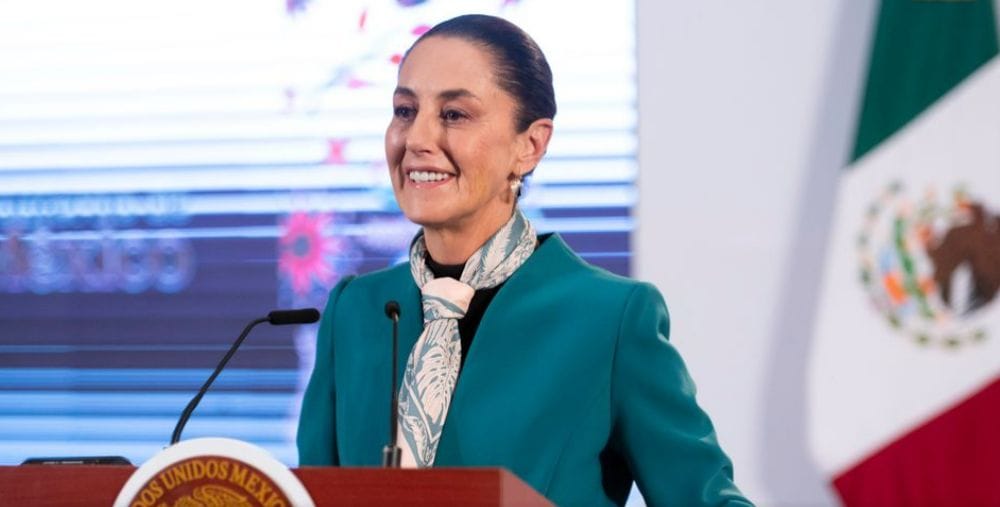Sheinbaum's Response to SCJN Ruling and Future Relations with the U.S.
During a press conference, President Claudia Sheinbaum addressed the U.S. election, expressing confidence in maintaining strong bilateral relations and assuring support for Mexicans in the U.S. amid potential changes.

On a brisk November morning, President Claudia Sheinbaum Pardo stood at the podium of her signature "People’s Morning Press Conference," beaming with satisfaction. “The people of Mexico triumphed,” she declared, her voice echoing through the grand hall. She was referring to the previous day's resolution by the Supreme Court of Justice of the Nation (SCJN), which dismissed challenges to her government’s judicial reform, marking a significant milestone in her administration’s sweeping efforts to reshape Mexico's judicial landscape.
“I am very happy,” Sheinbaum began, exuding a confidence bolstered by what she described as a triumph of reason over irrationality. “Yesterday, the people triumphed,” she emphasized, framing the court’s ruling as a pivotal moment in the ongoing national transformation. The resolution dismissed the actions of unconstitutionality aimed at halting the judicial reforms that have fueled fervent debate across the nation, impacting the structure and appointment processes within Mexico’s judiciary.
The High-Stakes Over Judicial Reform
At the heart of the controversy is Sheinbaum’s ambitious vision: a democratic overhaul of the judiciary, including the direct election of judges, ministers, and magistrates. This change, set to take place on June 1, 2025, has been lauded by her supporters as a measure of accountability and transparency but criticized by opponents as a potential threat to judicial independence. The president insisted that these reforms are necessary for the “profound transformation” of Mexico, underscoring a common theme in her administration's narrative.
The Supreme Court's deliberation was intense, with seven justices voting in favor of advancing the constitutional challenge. However, they fell short of the crucial eighth vote needed. The remaining four dissenters—essential in tipping the scales—ensured that the reform stood, a development Sheinbaum applauded as a victory of “sanity over irrationality.”
The president singled out the intricate legal arguments put forth by Norma Piña Hernández, the Court’s presiding minister. According to Sheinbaum, Piña's assertion that only six votes were necessary to advance the challenge amounted to a “constitutional pirouette,” a deft but ultimately untenable maneuver. “In other words, it was a twist, an unconstitutional pirouette,” Sheinbaum elaborated, invoking the language of gymnastics to describe what she viewed as an unsound interpretation. Nonetheless, she acknowledged the dissenting voices of Ministers Luis María Aguilar and another Justice Pardo, recognizing that even those typically at odds with her administration had upheld a commitment to judicial integrity.
Awaiting the U.S. Election Outcome
On the international front, Sheinbaum turned her attention to the unfolding drama of the U.S. presidential election. The contest between former President Donald Trump and incumbent Vice President Kamala Harris has gripped audiences on both sides of the border, with potential implications for Mexico-U.S. relations. Sheinbaum urged patience as the votes are tallied, emphasizing that an official government position will come only once the results are confirmed.
Despite the uncertainty, Sheinbaum exuded a tone of cautious optimism. She reiterated that regardless of the outcome, Mexico will maintain a high-level dialogue with Washington, focusing on critical issues like migration, drug trafficking, and arms smuggling. “There will be a good relationship with the new U.S. government,” she asserted, underscoring her administration's commitment to stability and cooperation. Her comments appeared calculated to soothe anxieties among both policymakers and the public, hinting at a pragmatic approach amid the shifting winds of international politics.
Reassurance to Mexicans at Home and Abroad
Mindful of the stakes for Mexicans residing in the United States, Sheinbaum took pains to project calm. Addressing the millions of Mexican nationals and dual citizens living across the border, she emphasized the government's enduring commitment to their welfare. “To the Mexicans in the United States, I say that we will always be with them and defending them,” Sheinbaum declared, a reassuring pledge as geopolitical uncertainties loom.
Highlighting an upcoming plan, she mentioned that the government’s consular network would soon unveil a comprehensive support scheme for Mexicans living abroad, designed to ensure their rights and well-being are safeguarded. This initiative, she suggested, is emblematic of her administration’s broader vision of a Mexico that defends its citizens no matter where they reside.
Political Calculations Amid Reform
The president's confident tone belies the complex, often contentious political landscape she navigates. Critics argue that the judicial reforms, particularly the election of judges, risk undermining judicial independence by exposing the judiciary to populist pressures. Analysts warn of a potential erosion of checks and balances, a cornerstone of Mexico’s democratic institutions. However, Sheinbaum and her allies counter that these reforms will democratize the judiciary, making it more responsive to the will of the people.
The stakes are undeniably high. As the June 2025 elections for judicial positions approach, the outcome will be seen as a litmus test for Sheinbaum's broader agenda. For now, though, she remains resolute, framing the latest Supreme Court decision as a vindication of her administration’s vision.
In a country where the judicial system has long been criticized for corruption and inefficiency, Sheinbaum’s proposed reforms strike a chord with many citizens eager for change. Yet, the tension between transformation and stability persists, with detractors cautioning that the price of reform could be too steep.
As President Sheinbaum concluded her address, the message was clear: This is a defining moment for Mexico, one that will shape its democratic institutions for generations. Whether history will judge this period as a time of necessary correction or one of overreach remains an open question. But for now, Claudia Sheinbaum Pardo stands firm, believing that reason and the will of the people are on her side.




